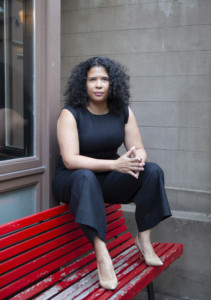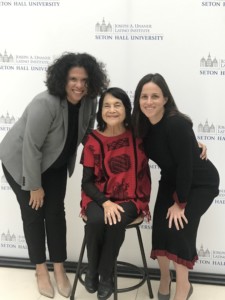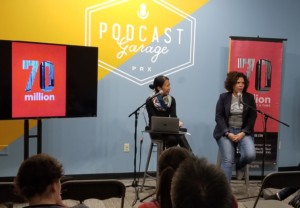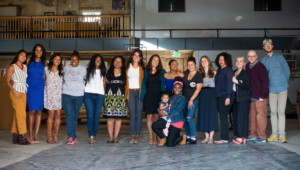Before she started the full-service podcast company, Lantigua Williams & Co., Juleyka Lantigua-Williams (I’ll call her Juleyka from here on to avoid confusing her name with that of her company) had a 20-year career in journalism, and telling the stories of Black and brown people filled her with a sense of purpose. Being a journalist taught her to make room for ideas and stories and people, a skill that was foundational when she started her company in June 2017 and continues to propel her today as she oversees a company built on anti-racist principles.
The entire reason I started my company was to center my work from the perspective of Black and brown people and tell their stories
During this time of pandemic-infused social unrest, many companies are asking themselves whether they support the Black Lives Matter movement and whether they are anti-racist. For Lantigua Williams & Co., the answers are simple because their core leadership, their content, and their messages are largely by and about Black and brown people.
“The entire reason I started my company was to center my work from the perspective of Black and brown people and tell their stories,” says Juleyka. “I’ve had to think, ‘is my company’s agenda, our growth plan, and our ambition aligned with doing the greatest good for my collaborators who are mostly people of color?’”

The answer is clearly, “yes.” Lantigua Williams & Co have produced over 100 episodes of Latina to Latina, an interview series centering Latina women. They just launched the third season of the Peabody Award nominee 70 Million, which tells stories about how the criminal justice system disproportionately impacts the 70 million Americans with criminal records by race and income, 22 episodes of How to Talk to Mami and Papi About Anything, about communication gaps between children of immigrants and their parents, and 21 episodes of Feeling My Flo, conversations about menstruation that remind listeners that menstruation happens to all types of bodies.
Lantigua Williams & Co. produces and edits works for other companies, too. One recent project is MacMillan’s Driving the Green Book, which looks at how dangerous it was for Black people to drive in the segregated South and what that means for us today.
“I feel really comfortable in saying I believe—and I think I have tangible proof of this—that what my company’s doing benefits, on the aggregate, the people who do the work, and the people who we collaborate with.”
Early life and inspirations
Much of the work of being anti-racist is making room for other voices, which Juleyka has been doing since she was five years old and growing up in the Dominican Republic. She was part of a big family, and when her cousins would get in trouble, she would be the one standing up for them to the adults, telling them, “that’s not fair!” “So everybody called me ‘the little lawyer’ and it kind of stuck,” she says.
When she was 10, Juleyka’s family moved to the south Bronx. Her mother wanted her to be fluent in English by the start of the school year that fall, so she began taking her to the library. Juleyka would routinely come home with 10 books at a time, read them all, and get 10 more the following week.
It was on one of these trips that Juleyka encountered The Family from Vietnam, an 80-page children’s historical novel about a family’s struggles emigrating to America that doesn’t sugarcoat what it’s like being in an unfamiliar and scary place. The Family From Vietnam helped center her emotionally in this unfamiliar country and inspired her to look beyond her circumstances.
At the time, Juleyka didn’t know when she would see the rest of her family in the Dominican Republic and, as her mother and stepfather worked around the clock, she was left alone with her books. “Reading about a family who left everything they knew for an unknown promise, and whose love filled them with the strength to survive moved me,” she says. “Especially because I was able to read it in English without any help, and so much of who I was becoming in my new country came together in that moment in ways I am still learning to understand.”
The book was a breakthrough both intellectually and emotionally, and she’s certain that learning that “real stories” were important enough to be written in books laid the groundwork for her work in journalism.
Journalism that makes room for others
Juleyka was the first-ever criminal justice reporter at The Atlantic. In the process of reporting her stories, she became angry with the carceral state.“It is absolutely staggering to me,” she says, ”that we claim to be the most advanced nation in the world and yet we warehouse people in dangerous conditions for unconscionable reasons.”
Anger can be an important source of energy; if you harness it properly you can do powerful things. The stories Juleyka collected while reporting on injustice gave her that anger-energy that she has carried forward ever since.
One of those stories, about how the incarceration of a family member affects the entire family, was the result of a five-month reporting fellowship and became a six-part series called “Losing Your Brothers to Prison.” She had been talking with someone who went to prison who told her how negatively it affected their younger sibling, so Juleyka did some research and couldn’t find anything of substance on this very important topic. She thought it was absolutely ridiculous, so she applied for and got a fellowship to write about it, leading to groundbreaking reporting still used by lawyers to defend clients. Her voice was already making a difference for overlooked people and overlooked stories, and her reporting during the fellowship added to the set of skills she would rely on later in her career.
After leaving The Atlantic, Juleyka moved to NPR. She spent the first six months of 2017 working as an editor and producer for the NPR podcast Code Switch, a show about race and how it affects our daily lives. Audio for her was a fresh way to tell stories. Energized by this new work, at the end of those six months she made the biggest leap of her life and decided to start her own podcast company.
Lantigua Williams & Co.
Juleyka told everyone she knew about her new company. That first month, she spoke to over 40 people, hoping to create a handpicked crew of hosts, producers, editors, and engineers with an eye towards providing opportunities to skilled people of color. Those early conversations landed Lantigua Williams & Co. work for Maria Hinojosa’s company, Futuro Media Group. Hinojosa is well-known in the Latino community for helping to start the public radio program Latino USA in 1992 and then hosting it for 20 years. Juleyka saw that first check from Hinojosa as a good omen. Holding it, she thought, “I don’t know how, but we’re gonna make it.”
The first original show by Lantigua Williams & Co. was Latina to Latina, hosted by broadcast journalist Alicia Menendez. Its first episode launched in April 2018 and featured a conversation with Jackie Cruz of Orange Is the New Black about her background, how she made it in Hollywood, and learning to trust people. Over 100 episodes later, the show just released a conversation with the same woman that wrote that first check to the company. Maria Hinojosa went on the show to talk about her life, career, and new memoir Once I Was You.

Before Latina to Latina,the new company was focusing mostly on client work. Juleyka began to grow frustrated that she wasn’t able to tell the stories of mass incarceration that were so important. From her years of reporting, she knew there is a “gap the size of the Grand Canyon between what experts and practitioners know about the criminal justice system and what the public knows.” A show about criminal justice would help fill that gap in an accessible way and center the people who are maligned by this system. So she sent a cold email to a contact at the MacArthur Foundation, writing that she wanted to make a show about the breakthrough stories in criminal justice reform that the foundation was already behind. It was “probably the most stressful email I’ve sent in my entire life.” Then she took a nap.
She heard back by the end of the day, and set up a conference call for a few weeks later.
The “little lawyer” impressed the MacArthur Foundation team with the amount of research she had done and they asked her to send them a concept paper. After googling “what is a concept paper”, she spent a month formulating a document to answer concretely how she was going to disseminate information about criminal justice to the public. The foundation liked her paper, asked her to apply for a grant, and that is how 70 Million — which put Lantigua Williams & Co. on the map — started.

Juleyka has remained accessible as a coach and inspiration to many and tells people who are serious about their process to write their own concept paper to learn the strengths and weaknesses of their ideas and discover things they haven’t thought about yet.
Success during the pandemic
Thinking of all her success this year in highlighting stories of people from the margins, I asked Juleyka how she stays grounded and humble as her company becomes more well known.
“I stay humble because I’m not done!” she says. “I’m not done working. I haven’t run the race. There is no finish line. I don’t have a singular way of measuring success so that when I achieve something I could say ‘yeah, I did it!’ And because there is no finish line I’m working towards, the concept of having to stay humble doesn’t even apply, because the work humbles you.”
Plus, making stories to represent the Latino audience she’s a part of isn’t just the right thing to do, it’s also good business. “Statistically speaking, we are the ascending majority,” she says. Not only is the Latino population growing as a whole, they are growing as podcast listeners as well.
This year, Lantigua Williams & Co. were one of the sponsors of the first-ever report on the listening habits of the US Latino population. The report, by Edison Research, found that 25 percent of Latinos listen to podcasts—and Juleyka is targeting that audience with stories that have mentioned every Latin American country except Belize. Even if she counted all the podcast-listening Latinos as her audience, there are still 75 percent of Latinos who are not yet in the market. Juleyka hopes to run a massive company that will be the go-to network when that listening audience reaches a saturation point in 15 or 20 years.
To find and target her listeners, Juleyka uses a business technique called “persona development.” She created a fictional representation of her ideal audience—a young, confident, digitally-savvy brown woman named Kenia, because she knows the future of the country is a brown educated woman. (You can see Kenia, as portrayed by a model, on the homepage of Lantigua Williams & Co..) Understanding the needs of the Black and brown women she’s been writing about her entire career helps Juleyka to have conversations with “Kenia.”
“I think about what she would like and what she will share,” Juleyka says. “Is she going to think this is corny, is she going to say ‘okay boomer?’ I think about how she’s going to react to things and how she will integrate them into her life.”
Being anti-racist
Our national conversation about race relations have pushed Juleyka into some awkward situations, like clear instances of tokenism where, for instance, she was asked to be on panel discussions training white producers even though she doesn’t do media training.
“I’m like oh, I must be the only brown person you know,” Juleyka says.

After the May 25 murder of George Floyd galvanized people and companies across the nation, Lantigua Williams & Co decided to participate with the hashtag #BlackOutTuesday. “My collaborators and I have had to think about whether or not we need to claim to be anti-racist when so much of our work is de facto anti-racist because it centers Black and brown lives.” She believes that a lot of the soul-searching going on right now comes from companies that have ignored or actively shunned those kinds of stories, and that by participating with them she would be taking away from the necessary work they need to do.
She says it’s a weird space to be in, wanting to contribute to the greater cause of anti-racism, but without wanting to shortcut other people’s learning process because doing that work is what gave her the career she has today.
“My experience and wisdom come from having confronted, subverted, and escaped systems of racialized order that endeavored to and depended on keeping women like me in their place,” she says. “And those who have benefited from such systems cannot use what skills and knowledge I gained in the process of becoming free, as their struggle is of a different nature.”
Juleyka says that people who have benefitted from systems of oppression must undo it in their private lives, then in their organizations, and finally the economic systems that “perpetuate the psychological apartheid that has maintained the racial pyramid scheme the United States has developed into.”
The work of being anti-racist never ends, but it starts with conversations. There’s maybe no better place to look for inspiration to fuel those conversations than Lantigua Williams & Co.
Special Playlist
This playlist was hand-picked by Juleyka for listeners that are new to Lantigua Williams & Co. shows.




Comments